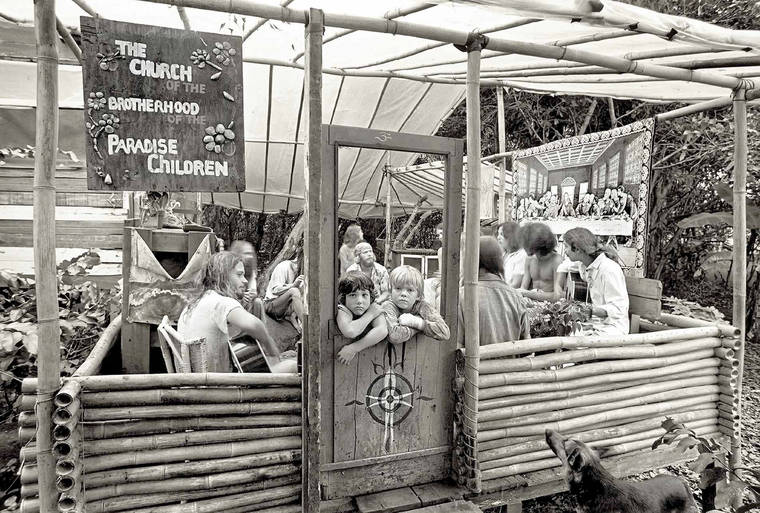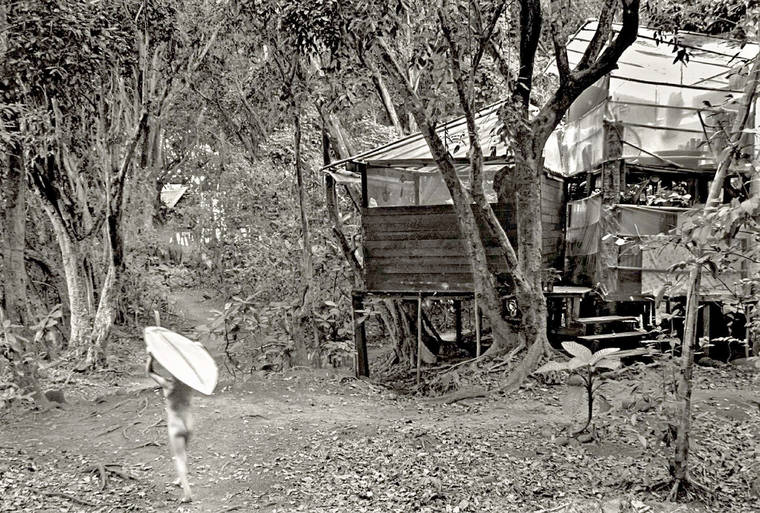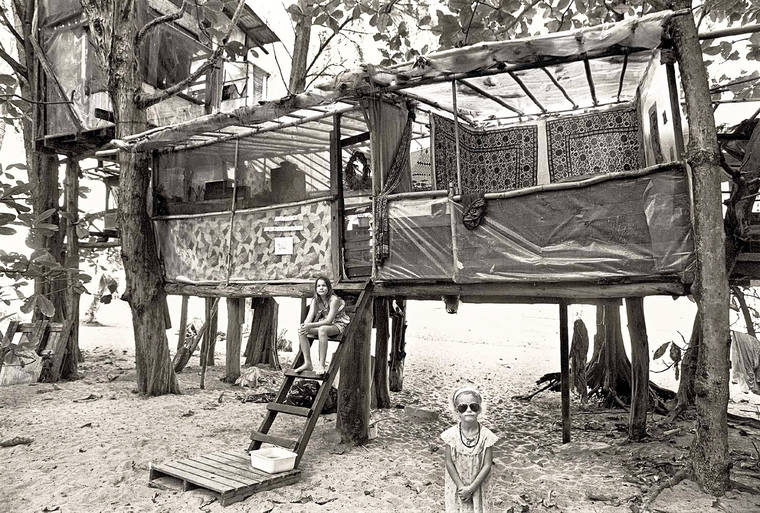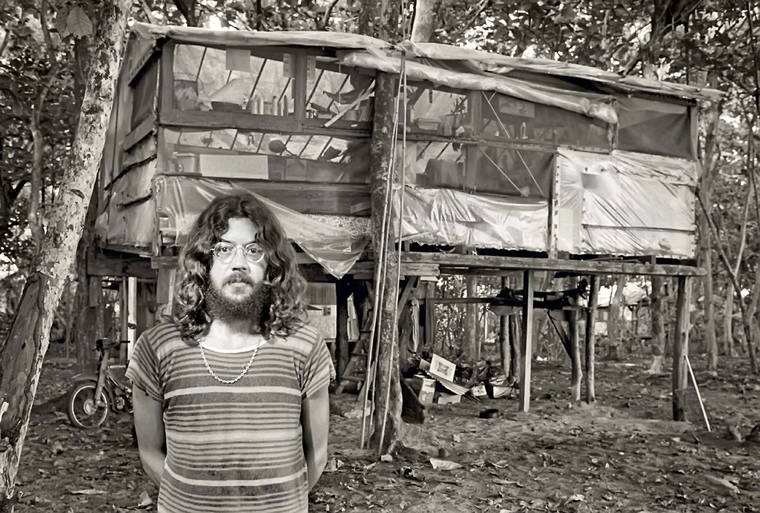Taylor Camp film ‘The Edge of Paradise’ to be shown Saturday

John Wehrheim / Special to TGIFR!DAY
There was even a church at Taylor Camp in Haena.

John Wehrheim / Special to TGIFR!DAY
A resident returns to Taylor Camp after surfing.

John Wehrheim / Special to TGIFR!DAY
Diane Daniels was a young, ambitious entrepreneur. By 20 she had started a popular Montessori school in Hanalei. Diane and her surfer boyfriend, Terry Lishman, built the nicest treehouse in the village, a solid, two-story beachfront with a panoramic ocean view.

John Wehrheim / Special to TGIFR!DAY
One of the Taylor Camp tree houses.

John Wehrheim / Special to TGIFR!DAY
Roberto in front of a Taylor Camp home.
The Edge of Paradise is more than a film about Taylor Camp on Kauai.
“The Edge of Paradise” is more than a film about Taylor Camp on Kauai.
It’s also about a time of great turmoil and transition on Kauai, the nation and the world. Protests, rallies and cries for free speech rose to prominence and changed the culture.
“This sort of thing was happening all over the world,” said John Wehrheim, producer.
He referred to it as a time of a “kind of crazy youth movement, rebelling against status quo.”
His high-definition film, “The Edge of Paradise,” will be shown with closed captions at 7:30 p.m. Saturday at Porter Pavilion at Anaina Hou Community Park in Kilauea.
Tickets are $15.
The film chronicles the inner-workings of the North Shore’s hippie and surfer enclave Taylor Camp from 1969 to 1977 before it was dismantled by the state. It features interviews, surf footage and historical photos.
The camp was started by actress Elizabeth Taylor’s brother, Howard. There were less than 30,000 people living on Kauai, and the island’s economy was collapsing. People were leaving.
That’s when Taylor Camp found footing.
“People fleeing the mainland to Kauai encountered an empty island, an abandoned garden,” Wehrheim said in a phone interview this week with TGIFR!DAY. “It was a special, unique time.”
It was a place of love, of family, of friends, of freedom, of independence, of community, of togetherness.
It was also a place at times of lawlessness, of drugs, of drinking and of disputes.
“It was pretty much a free-for-all. He just turned these seven acres on the beach in what’s now Haena State Park and let them do whatever they wanted to do,” Wehrheim said in a previous interview with TGI.
The result of that was a community of beautiful tree house architecture that inspired Wehrheim when he saw it.
Wehrheim became acquainted with Taylor Camp in 1971 when he was living in Howard Taylor’s guest house. Campers often visited Taylor’s home to borrow tools and he would be sent to retrieve them from the camp. As a photojournalist, he was drawn to the beauty of the camp’s architecture and the beautiful lighting. He knew it needed to be documented.
“Taylor Camp” was originally released in 2011 and shot in standard definition.
In previous showings on Kauai, tickets have sold out. The film connects with those on Kauai, those who lived through the days of Taylor Camp, and pretty much anyone curious about life on this island at a time that will never be seen again.
“To see this film and relive those days, it’s a very rare moment, and we caught it,” Wehrheim said. “It’s sort of a time travel for people.”
It was a time a person could hitchhike in Haena and never get picked up — because nobody was driving on the road.
It was a time when there was a car on the road, you know who was driving it.
Taylor Camp was a community of surfers, hippies, college dropouts, draft-dodgers, doctors, educators, families, and a few locals. Taylor Camp brought an odd collection together and, somehow, for years, it worked, with folks in tree houses that had old furniture, used dishes and well-worn musical instruments.
It was a time of freedom. Nobody had student debt. They were free to be creative, explore and test life, take chances and adventures and push the limits.
“It’s a different era now,” Wehrheim said. “Debt really limits the freedom and creativity of our young people when they get out of college.”
They came for their own reasons, often battling their own demons, running from their past, and seeking peace of mind and heart, and healing of soul.
Some even found it in the place they saw as paradise.
“Taylor Camp at the end of the road was a magnificent place, a beautiful place,” Wehrheim said.
But, as he says, a place alone can’t heal anyone. It can’t solve problems.
“A lot of people, in my observations, came to Kauai thinking it was going to heal them,” Wehrheim said.
It didn’t.
His film is balanced, he said, as it does not paint a Utopian picture of Taylor Camp. The place had problems with drugs, alcohol and violence. Police came calling. Newspaper articles told of issues that ended up in court. There were calls for government to shut the camp down — which eventually happened.
“It’s certainly not super hippie propaganda,” he said.
“The Edge of Paradise” has earned strong reviews, something Wehrheim is proud of.
“The book and film are frequently used in university classrooms and have been added to library collections around the world,” he wrote. “It is very satisfying for my work on Kauai (as well as Bhutan) to be taken seriously by artists, writers, publishers and academics internationally, and I’ve been enriched by the friendships that have resulted.”
The Huffington Post did a feature with almost 2 million views. There’s been an avalanche of similar unsolicited media attention, including from the Smithsonian, London Daily Mail, Slate, Buzz Feed, and many more print articles and blogs across the U.S. as well as England, France, Japan, Thailand, Germany, Spain, Brazil, with over 20-million magazine, blog and social media views and shares.
Those reviews include:
w Michael Pollan, author of “How to Change Your Mind; The Omnivore’s Dilemma,” wrote: “It’s spectacular! … The photography is gorgeous and beyond that, how fortunate that such a utopian experiment was so lovingly documented.”
w Paul Theroux, America’s leading travel writer, said: “Impressive! A real time capsule of an era and a place — humane and atmospheric — and news to most people. I love the Before and After faces and bodies, and the theme of violated Eden, or After the Fall…”
w Gavan Daws, author of Hawaii’s No. 1 best-selling history, “Shoal of Time,” said: “The best piece of sociocultural writing I have read about modern Hawaii.”
Friends still ask Wehrheim where the camp was, but all signs of it are gone.
“There’s absolutely no evidence it ever existed,” he said. “It’s gone without a trace.”
But you can still see it — and feel it, too — on Saturday when you watch “The Edge of Paradise.”
Tickets: visit anainahou.org or call 828-2118
•••
Bill Buley, editor-in-chief, can be reached at 245-0457 or bbuley@thegardenisland.com.

